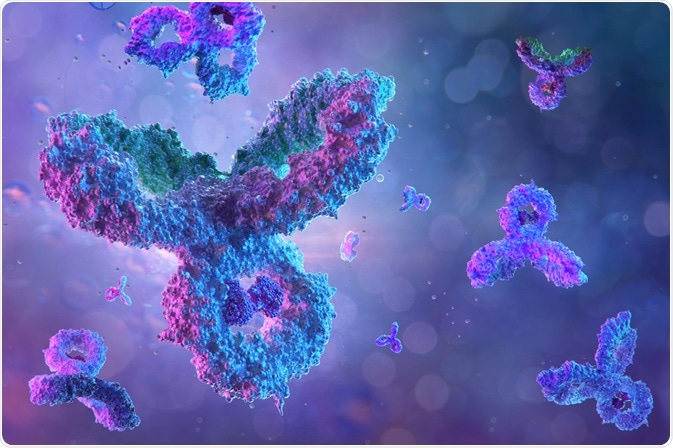Infliximab is a type of monoclonal antibody drug that is classified as a biologic. This drug acts as an immunosuppressant drug and is commonly used to treat autoimmune diseases such as ankylosing spondylitis, Crohn’s disease, rheumatoid arthritis (RA), ulcerative colitis (UC), psoriasis, and psoriatic arthritis.

Image Credit: Corona Borealis Studio / Shutterstock.com
Mechanism of action
Infliximab inhibits a chemical called tumor necrosis factor (TNF)-alpha. This chemical is responsible for triggering inflammation at various sites in the body.
Infliximab is administered by a very slow intravenous injection in a hospital setting. Typically, this drug is used to treat autoimmune diseases in patients who have either not responded or do not tolerate other treatment modalities.
How do monoclonal antibodies work? Rituximab, infliximab, adalimumab and others
Complications
Complications may arise with the use of infliximab, some of which include:
- Allergic reactions, both immediate and delayed (3-12 days after injection).
- Serious life-threatening infections, which can be viral, bacterial or fungal in nature. These infections often flare up as a result of the suppression of the natural inflammatory reaction to intruders.
- Interactions with medications such as theophylline or warfarin.
- Worsening of congestive heart failure.
- Hepatitis.
- Optic neuritis.
- Seizures and other nervous system complications.
- Bone marrow suppression.
- Lupus-like syndrome.
- Worsening of existing psoriasis or new development of new psoriasis.
Risk factors for complications
Some patients are more prone to developing an infection while on infliximab therapy. Risk factors for infective complications with infliximab include:
- Age over 65.
- Pre-existing infection of any kind.
- Cuts or wounds in the skin.
- Diabetes
- Immunosuppressive drugs.
- Tuberculosis infection or contact with a tuberculous patient.
- Presence or history of hepatitis B.
- Other biologic medications used to treat the same kind of conditions as infliximab.
- Vaccination with live viruses while on treatment.
There are also certain risk factors that can increase a patient's vulnerability to other complications. A history of phototherapy, for example, can increase the patient's risk of skin cancer. Additionally, a history of nervous system illness such as seizures or Guillain-Barre syndrome may also precipitate nervous system complications.
Adverse effects
Like any medication, infliximab may cause adverse effects, such as:
- Nausea
- Heartburn
- Abdominal pain
- Headache
- Nasal discharge
- Yeast infection
- Higher risk of some cancers, such as lymphomas and skin cancers
Recommended precautions
To minimize the risk of adverse reactions and complications, it is generally recommended that patients on infliximab take certain precautions, such as:
- Avoid people with apparent infections.
- Avoid pregnancy for at least 6 months after stopping treatment.
- Avoid breastfeeding while on treatment.
- Avoid alcohol abuse.
- Avoid all foods which are not well-cooked, such as Brie cheese or unpasteurized milk.
- Inform caregivers of infliximab use, particularly before receiving any prescription or undergoing any procedure.
- Inform caregivers of all current medications prior to starting infliximab therapy.
References
Further Reading
Last Updated: Jan 18, 2023